Content
Peony Summer Glau is a hybrid peony with large flowers up to 18 cm in diameter. It blooms mainly in the second half of summer, it decorates the garden well both in single and in group plantings. It does not have any special requirements for care, but it needs abundant watering and regular fertilization.
Description of peony Summer Glau
Summer Glau is one of the most beautiful peonies. This hybrid variety was developed in the early 1990s in the United States. The bush reaches a height of 80 cm, but the main value is represented by large double flowers. They are painted in creamy, creamy shades with pale, peach-yellow accents. They contrast well against the dark green leaves.
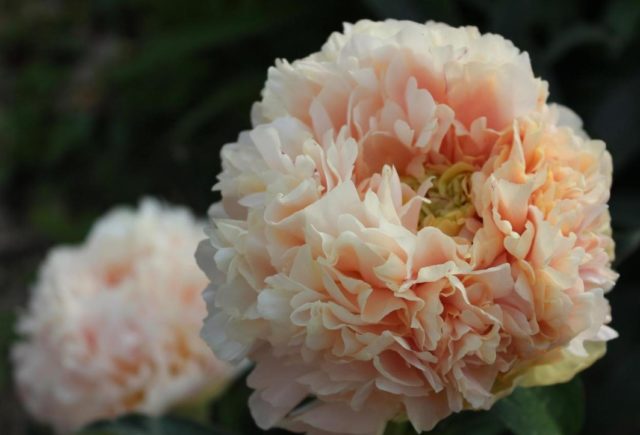
Peony Summer Glau casts delicate, large flowers exuding a delicate aroma
It grows very slowly, the bush is compact, not sprawling. However, it produces a lot of lush, heavy flowers, so it needs supporting supports. This can be an ordinary peg to which a bush is tied. On average, the Summer Glau peony blooms successfully for several years in a row, producing lush, fragrant flowers.
Refers to light and moisture-loving varieties, therefore, when breeding, it is better to choose the southern and eastern sides of the garden. Moreover, the plant also tolerates shade well. Differs in increased winter hardiness, growing zone 3. According to various sources, it can withstand frosts from -34 to -40 degrees.
Therefore, it can take root in different regions:
- Central Russia;
- Northwest;
- South of Russia;
- Ural;
- Siberia;
- Far East.
Flowering features
Flowers of creamy, white, creamy shades interspersed with fawn, orange and peach flowers. Variety characteristics:
- large-flowered (up to 18 cm in diameter);
- terry;
- type: tree shrub.
Summer Glau blooms usually in the second half of July and August, so this variety is a late flowering variety. The splendor of flowering mainly depends on the following factors:
- soil fertility;
- the degree of looseness;
- area illumination;
- fertilization and watering.
Application in design
Peony Summer Glau, thanks to its beautiful foliage and lush flowers, looks good even in single plantings. For example, it can be placed along paths, on an open lawn, next to a veranda, pergola or bench.
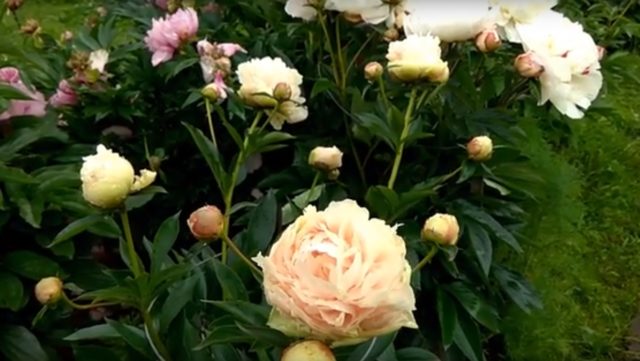
Peony Summer Glau looks good in single plantings
The shrub goes well with many other flowers. It also harmonizes with perennial conifers. Summer Glau is often planted in mixborders, combining them with asters, delphiniums, geleniums and other beautiful flowers.
When planting the Summer Glau peony, it is important to remember that it likes to dominate, absorbing moisture and nutrients from the soil. Therefore, you should not place it next to colors such as:
- anemone;
- Adonis;
- lumbago and other representatives of the Buttercup family.
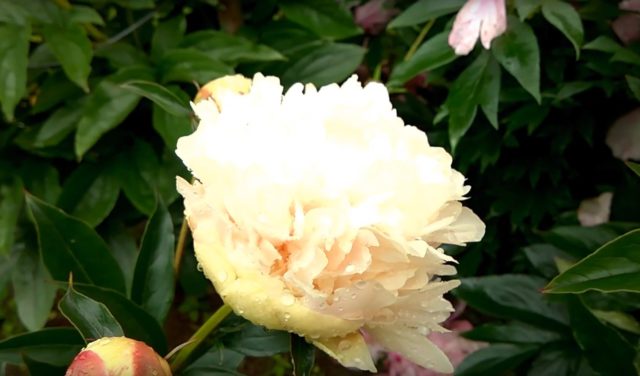
Lush, delicate Summer Glau flowers and rich green foliage are a real decoration of the garden
Reproduction methods
Peony Summer Glau is more often propagated vegetatively:
- using layering;
- cuttings;
- dividing the bush.
Since this variety does not like to be disturbed, it is not worth propagating by dividing the bush. It is better to try an easier way - for example, dilute the peony with cuttings. It is this method that is used when breeding valuable, exotic varieties.
The instruction is simple:
- Reproduction begins when the Summer Glau bush has reached an average age of 4-5 years. 10-15 cuttings can be prepared from one plant.
- They are cut in the first half of June - preferably from the middle part of the stem. The length of the cutting is arbitrary, the main condition is that it has at least 2 internodes.
- The upper part is trimmed 2 cm above the last sheet. The cut is made from below under the sheet pillow.
- Soak for several hours in a growth stimulant ("Epin", "Kornevin").
- They are planted directly in open ground at an angle of 45 degrees in fertile soil (equal parts of humus and sod land) with a top layer of sand 6-7 cm.
- Spray with water 3-4 times a day for 10 days, first grown under glass or under a film at a temperature of 24-25 degrees.
- Then they begin to ventilate (after 3-4 weeks), the spraying is reduced.
- After 2 months, a greenhouse is opened.
- For the winter, they mulch well with sawdust, as well as needles, straw or fallen leaves - the seedling must be completely filled up.
- In the spring (March - April), the mulch is removed and the cuttings are transplanted to a permanent place.
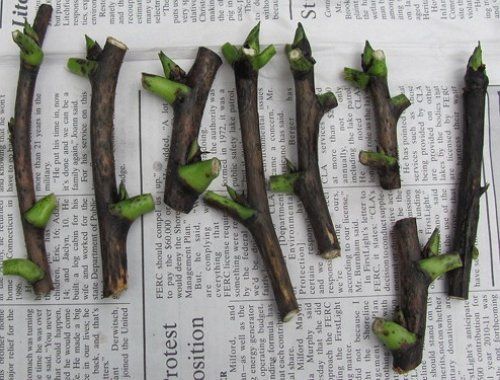
The main breeding method of the Summer Glau peony is by cutting the stem
Landing rules
It is better to purchase Summer Glau seedlings in proven nurseries or stores. This must be done at the end of summer in order to immediately plant it in open ground. The optimal time is considered the last week of August, since at this time the autumn growth of roots begins, and on the other hand, the weather is still warm even in the Siberian and Ural regions.
When choosing a place, it is recommended to pay attention to several points:
- it should be open - only a faint shadow is allowed;
- ideal if the site is protected from strong winds by fences, a bench, bushes and other shelters;
- it is advisable to plant in a dry place, on a small hill, since moisture can stagnate in the lowland after rains.
Ideally, it is better to prepare the planting hole in April so that the soil shrinks. But if it did not work out, then you can plant the Summer Glau peony directly in fresh holes. The sequence of actions is as follows:
- They clean and dig up the area to a depth of 50 cm.
- Dig a middle hole (diameter 40 cm, depth 50 cm). At the same time, they are guided by the size of the roots - they should be freely placed in the fossa (sometimes the size is increased to 60 cm).
- A mixture of garden soil with compost (in equal amounts) is poured onto 2/3 of the depth of the hole, 200 g of superphosphate fertilizer and 60 g of potassium dressing are added.
- Water abundantly so that the consistency of the soil becomes like porridge.
- The seedling is deepened so that the upper buds are close to the surface (up to 5 cm in depth).
- They cover it with earth from above, but do not tamp it.
Follow-up care
Despite the fact that the Summer Glau peony variety is exotic, caring for it is not as difficult as it might seem at first glance. The rules are exactly the same as in the case of other, more familiar varieties.
It is not watered too often, but very abundantly - 2-3 buckets per flower. The soil should remain very moist, in the future they are guided by the weather. If it rains, water it only 1-2 times a month, if necessary. In case of drought, watering should be weekly. For long-term retention of moisture, the roots are mulched with needles, sawdust (layer 5-7 cm).
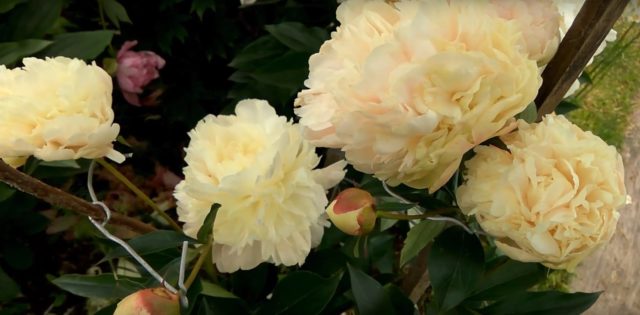
Regular feeding guarantees the lush bloom of the Summer Glow peony.
For lush flowering, the Summer Glau peony must be fed several times per season:
- After the snow has completely melted, give 2 g of potassium permanganate per 5 liters of water.
- When the shoots have begun to grow, they are fed with nitrogen - for example, 15 g of ammonium nitrate per 10 liters of water.
- In mid-May, a complex mineral fertilizer is given, the dosage is determined according to the instructions.
- When the buds are tied, along with ammonium nitrate (7.5 g per 10 l), superphosphate (10 g) and potassium salt (5 g) are given.
- At the end of the flowering of the Summer Glau peony (after half a month), fertilizer is applied a second time - again superphosphate and potassium salt in the same amount.
Preparing for winter
Despite the fact that the Summer Glau peony belongs to winter-hardy plants, it needs additional preparation for the winter period. According to the recommendations of experienced gardeners, the sequence of actions should be as follows:
- The last top dressing (potassium salt and superphosphates) is applied at the beginning of September. At the same time, you can give 2-3 buckets of water - shock watering for the winter.
- It is advisable to prune a peony right on the eve of the first frost or immediately after it. The stems are harvested directly to ground level, leaving only 2-5 cm.
- Top covered with fallen leaves, spruce branches with a layer of 5-10 cm. You can use rotted sawdust, compost or peat. It is allowed to fall asleep with the foliage of the Summer Glau peony itself, if it was not sick with anything in the summer.
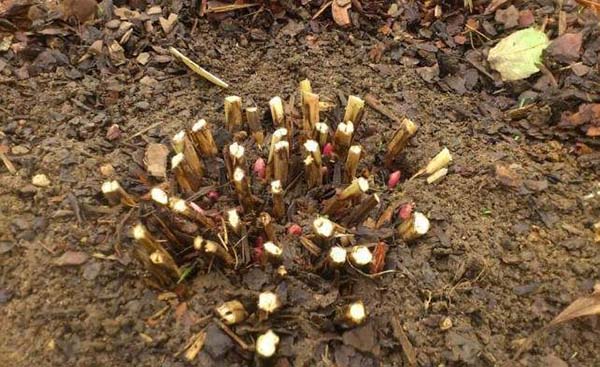
During the autumn pruning, the branches of the Summer Glau peony are almost completely removed.
Pests and diseases
The Summer Glau variety is resistant to many pests and diseases, but sometimes it is affected by fungal and viral infections:
- rust;
- powdery mildew;
- gray rot;
- mosaic leaf disease.
Among insects and other arthropods, special harm is caused by:
- aphid;
- ants;
- root knot nematodes;
- thrips;
- hop thinworm.
Methods of prevention and treatment are traditional - treatment with fungicides ("Maxim", "Skor", "Topaz", "Fitolavin") and insecticides ("Biotlin", "Green soap", "Aktellik", "Karbofos"). It is allowed to use folk remedies (solutions of baking soda, mustard powder, ammonia).
Conclusion
Peony Summer Glau is one of the most beautiful hybrid varieties, which is distinguished by large flowers of pastel colors. Due to its increased winter hardiness, it is suitable for growing in different regions of Russia. Since the plant does not need special care, not only an experienced, but also a novice florist will be able to cope with its cultivation.








